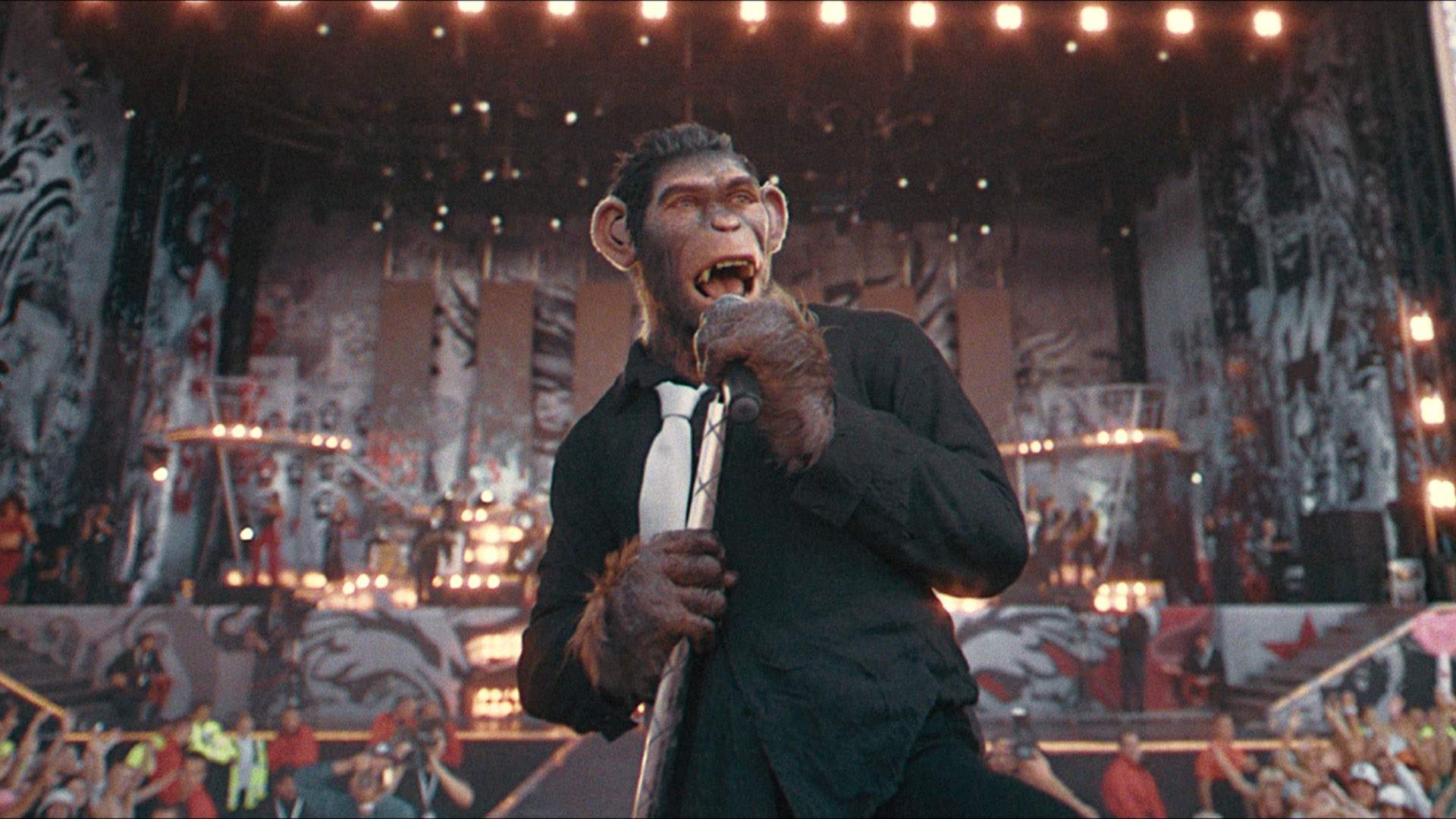Remaking the Music Biopic with Motion-Capture and a CGI Monkey: Michael Gracey and Jonno Davies Talk 'Better Man'
Bringing an IRL music star's story to the screen is a cinema go-to, but there's never been a version like this Australian-made, Robbie Williams-focused movie.
Let them entertain you: with Better Man, the Robbie Williams biopic that takes its name from one of the British singer's tunes, filmmaker Michael Gracey and actor Jonno Davies have a clear mission that's shared with the man in the spotlight himself. The Australian-made, 16-time AACTA-nominated movie tells the warts-and-all tale of the boy from England's Midlands who has become an international superstar. It charts Williams' path through a complicated childhood, teen boy-band fame, relentless press attention, struggles with drugs and alcohol, tabloid-fodder relationships, a well-publicised reputation for partying, going solo, huge hits, sizeable scandals and plenty of reinvention — and, while never shying away from the tumultuous times that its subject has endured, it matches its unflinching view of his ups and downs with his love of monkeying around and putting on a show.
The simian aspect of Better Man is literal. More than 20 years after 'Me and My Monkey' was a track on Williams' fifth studio album Escapology — a record that skewed personal to explore his experiences with pop stardom, and made hits out of 'Feel' and 'Come Undone' — his story reaches the screen with the former Take That member portrayed by a CGI chimpanzee. The approach renders Williams both a cheeky monkey and a performing monkey, and also reflects a journey that's had him swinging from limb to limb in life's jungle. The conceit was Gracey's choice, but based on the musician's own descriptions when chatting the Australian filmmaker through his existence.
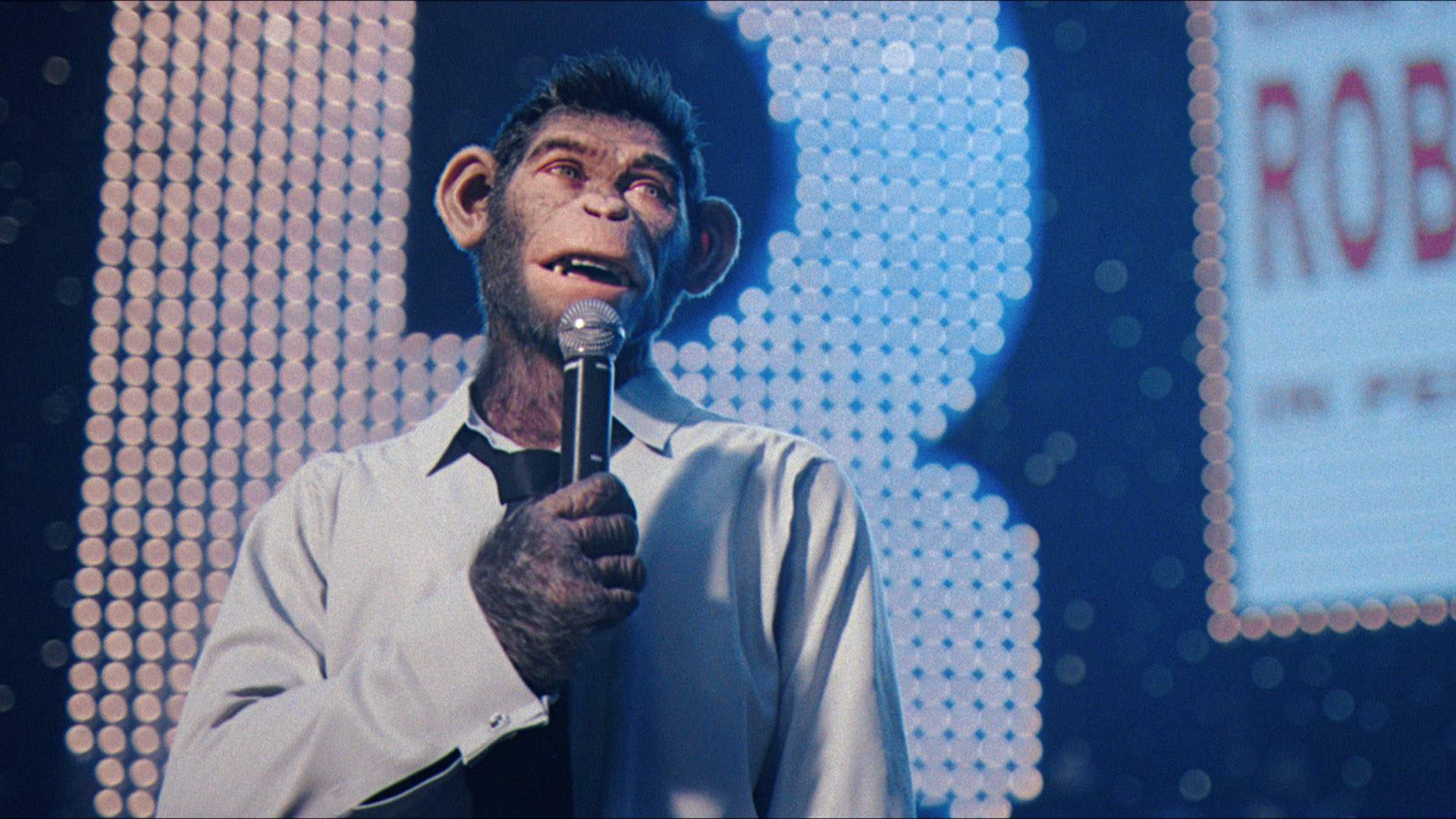
Better Man's helmer and subject first met when the director needed the singer's assistance with the former's debut feature. One of The Greatest Showman's original tunes won a Golden Globe and was nominated for an Oscar; however, star Hugh Jackman (Deadpool & Wolverine) had doubts about the songs going in — and, because the actor kept referencing Williams as a touchstone for his lead portrayal in the movie, Gracey hit him up for his thoughts and powers of persuasion. From there, the pair kept talking, then started recording Williams recounting his life story in the latter's studio. Next sprang the idea to make Better Man, which is how an Aussie talent came to craft a homegrown flick about one of the UK's biggest music figures of the past three decades.
The film was initially announced in 2021, and news of Davies playing Williams arrived in 2022. That Better Man was going ape remained a secret until initial viewers cast their eyes on the flick at its world-premiere at the 2024 Telluride Film Festival, which was no easy feat. "I was astounded, because we really didn't want people to see any images from the film, and it blew me away that we managed to keep that under wraps for so long — just because we did scenes where we had 2000 extras, so at any point someone could've even given away shots of Jonno in the motion-capture suit. Or some image from the work that Wētā were doing could've found its way online. And it just didn't," Gracey tells Concrete Playground.
"We tried really hard to make that the case because we wanted it to land in a way that was a very unique way to lens this story. And also having pitched it unsuccessfully for many years to financiers, I also knew that it would never make sense until people got to watch it," the filmmaker continues. "So there was really no point having chatter about an image and the conversation of whether that looks like Robbie or doesn't look like Robbie. I think that the most overwhelming response has been from people who are even sceptical about the conceit, that once they watch the film, they understand. And so I just desperately wanted to get in front of people before the conversation about 'why the monkey?'."
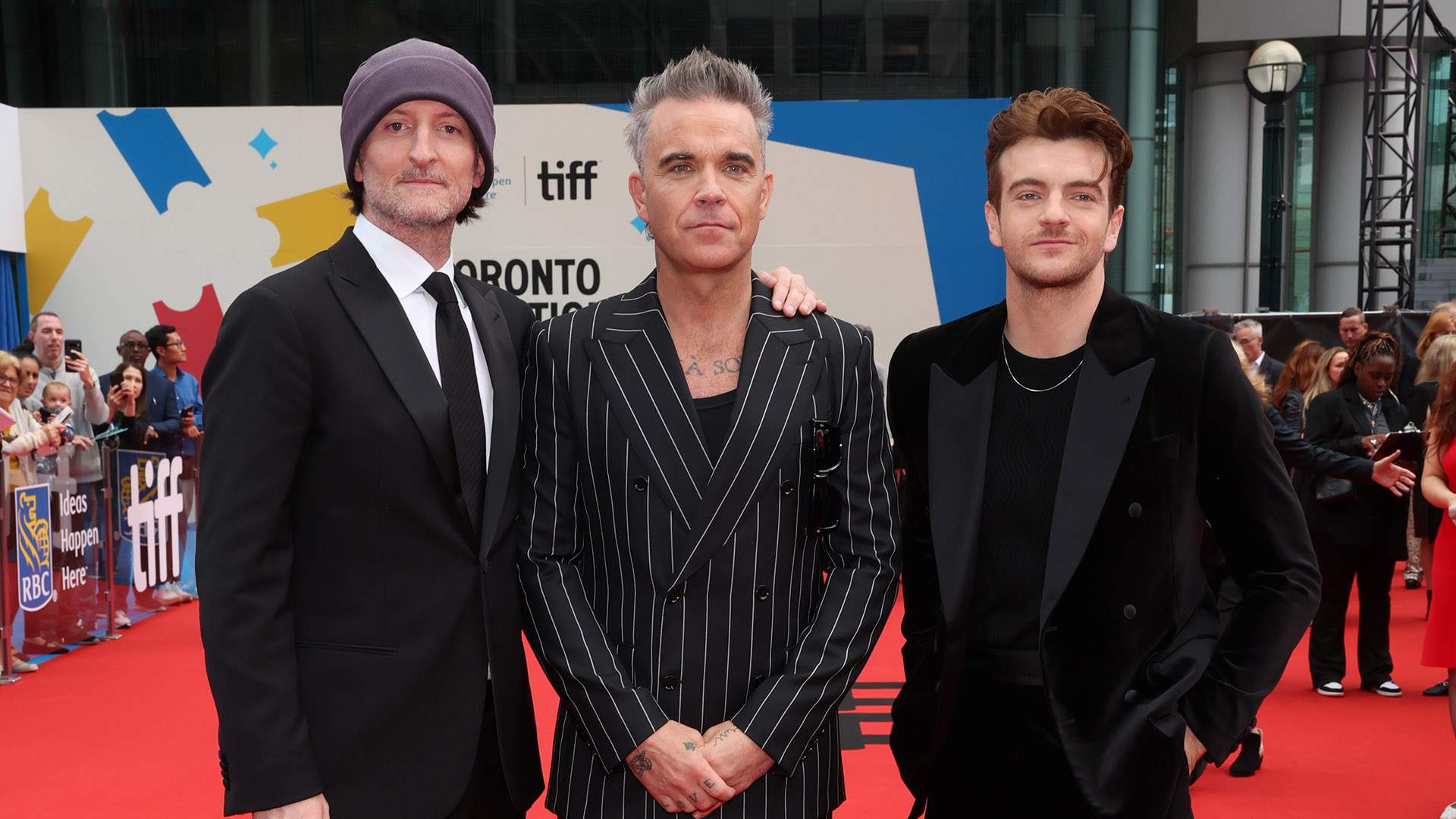
Monica Schipper/Getty Images for Paramount Pictures
A decade on from his screen debut in British TV's Casualty, Kingsman: The Secret Service and Hunters alum Davies has notched up what might prove the most-unique role of his career: playing Williams via motion-capture, and also voicing him in his younger years (Williams lends his own vocals to the movie, too). For his efforts, he's among the AACTA contenders for Best Actor. A fan going in of the man that he's portraying and of The Greatest Showman, Davies was instantly keen to take on the part, and has been revelling in the reactions that the movie has been earning since.
"What's brilliant is seeing different audiences respond to the movie, whether that's an age thing, whether it's different continents, people that are Robbie Williams fans, people that have never heard of Robbie at all, and seeing how different people respond to it in different ways," Davies shares. "And seeing it being universally accepted — I think that was something we always wanted to focus on, is that Robbie is an everyday man. There's something in him, whether it's the relationship he has with his nan, whether it's his fear of imposter syndrome, there's something in him that anyone can relate to. There's something there that people connect [to]. I know Michael's had people coming up to him and saying 'I spoke to my dad for the first time in seven years' or people watch it and go 'you know what, it's made me want to ring my mum more or get in touch with the people I love'. Having those different connections and different responses is why you want to make cinema, why you want to make a film — is to affect people. It's been a joy."
Down Under, Better Man was already making a splash before it reached Aussie cinemas on Boxing Day 2024; breaking the record for the most AACTA nods in a single year will do that. In a country with well-known fondness for Williams — if a biopic wasn't going to come out of Britain, Australia always seemed the next logical place for it — its main man has been popping up headlining the ABC's New Year's Eve coverage and doing a free gig in Melbourne's Federation Square, helping to give the movie a push, too. For viewers not instantly enticed by its subject or approach, the flick's biggest enticement sits within the feature itself, though. When 'Rock DJ' breaks out in a sequence filmed on London's Regent Street, it's a spectacular movie-musical moment.
Gracey and Davies are relaying the tale of another great showman, after all, although that standout scene almost didn't happen. We also spoke with Better Man's director and co-writer, plus its star, about that unforgettable segment of the film, stepping into Williams' shoes — or a chimpanzee's feet, to be more accurate — and why monkeying around was the best way to tackle Williams' tale, as well as fandom, resilience and the full impact of Hugh Jackman's Williams obsession on The Greatest Showman.

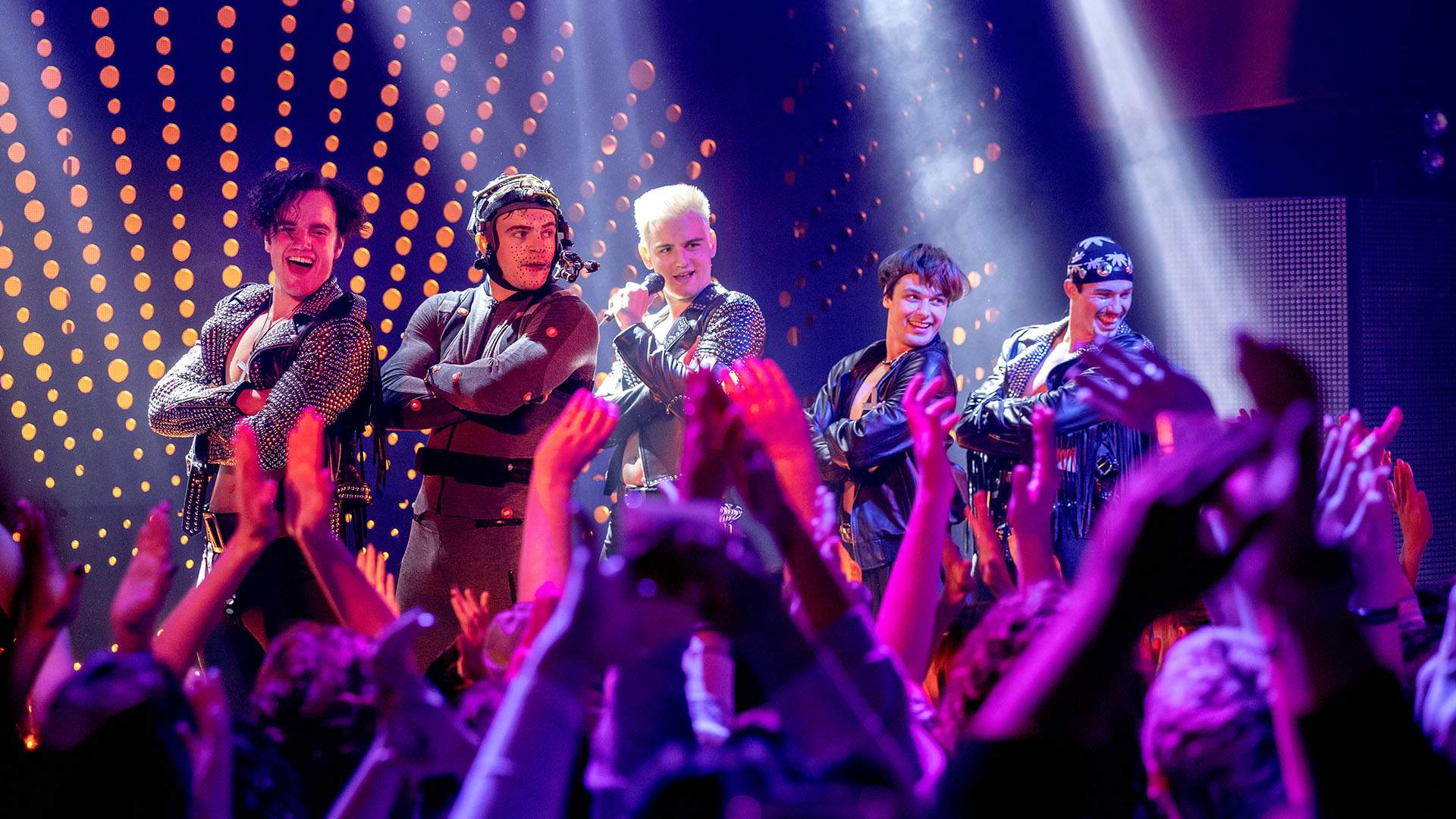
On Davies Playing the Man Responsible for One of His First Music Memories
Jonno: "I was definitely a fan growing up. I saw him concert when I was nine with mum and dad. It's one of my earliest music memories, really. And when you're a child, you have no idea what your identity is, you're just in for a good time — and seeing this rock star on stage, peacocking about like he does, connecting with an audience, seeing how he's there to entertain the crowd rather than entertain himself.
So then to 25-odd years later to be the one to play him is quite a pinch-me moment.
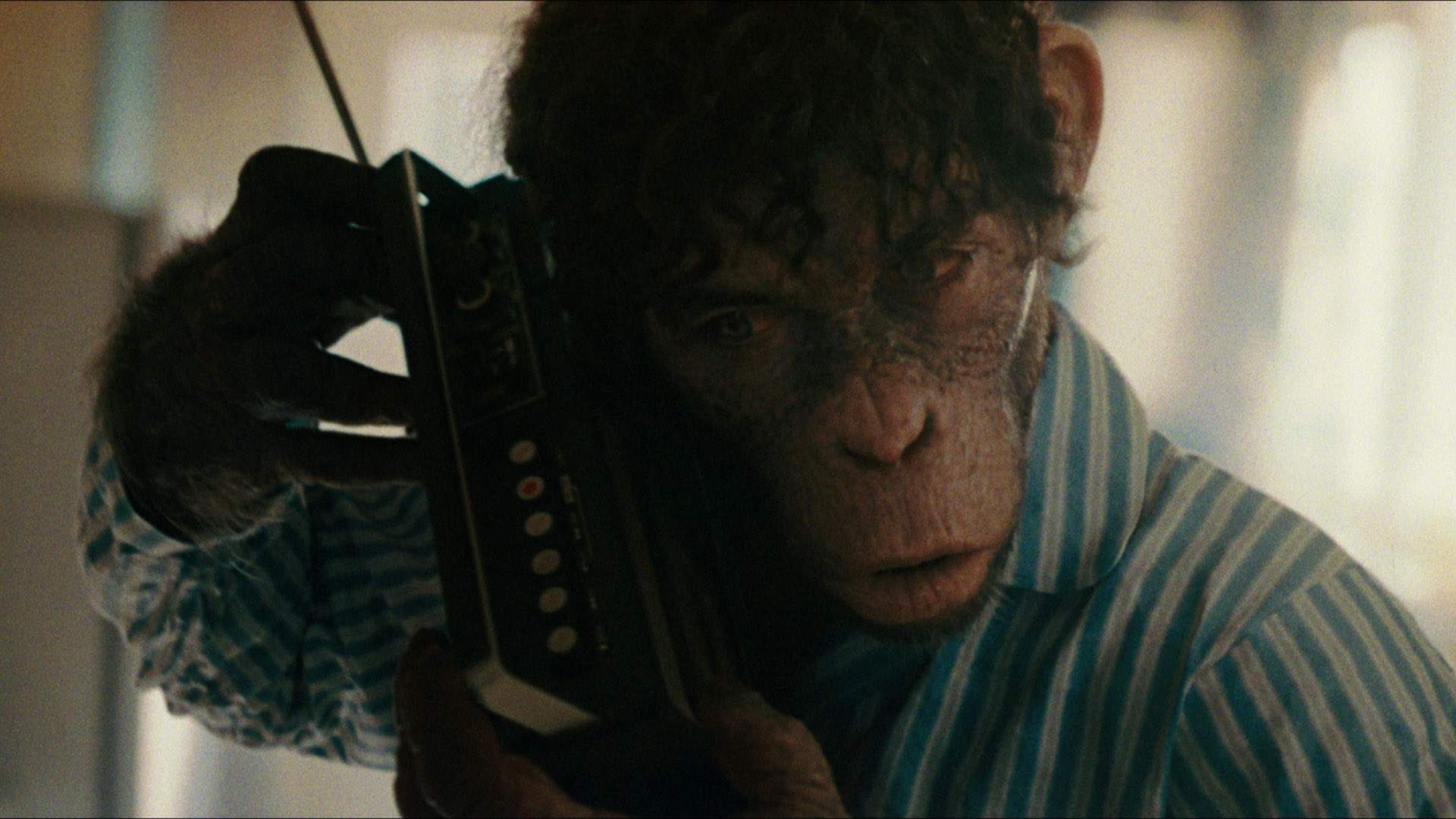
I think it helped being from the UK, understanding the peak of his fame, how heavily, heavily documented his life was — much to his detriment, the lack of privacy there when he was suffering — I think that was a nice insight to have.
But then also meeting in-person when we were in Melbourne when we first started, and then getting the rest of the story and sitting down with him, and him sharing some of his more vulnerable parts of himself — because he wants to make sure that this was an honest depiction.
It takes someone very brave to allow themselves to be painted in quite a bad light a lot of the times in the movie. And so the fact that he then gave us his trust to collectively tell his story in a very honest and truthful way, I think it shows a calibre of a person."

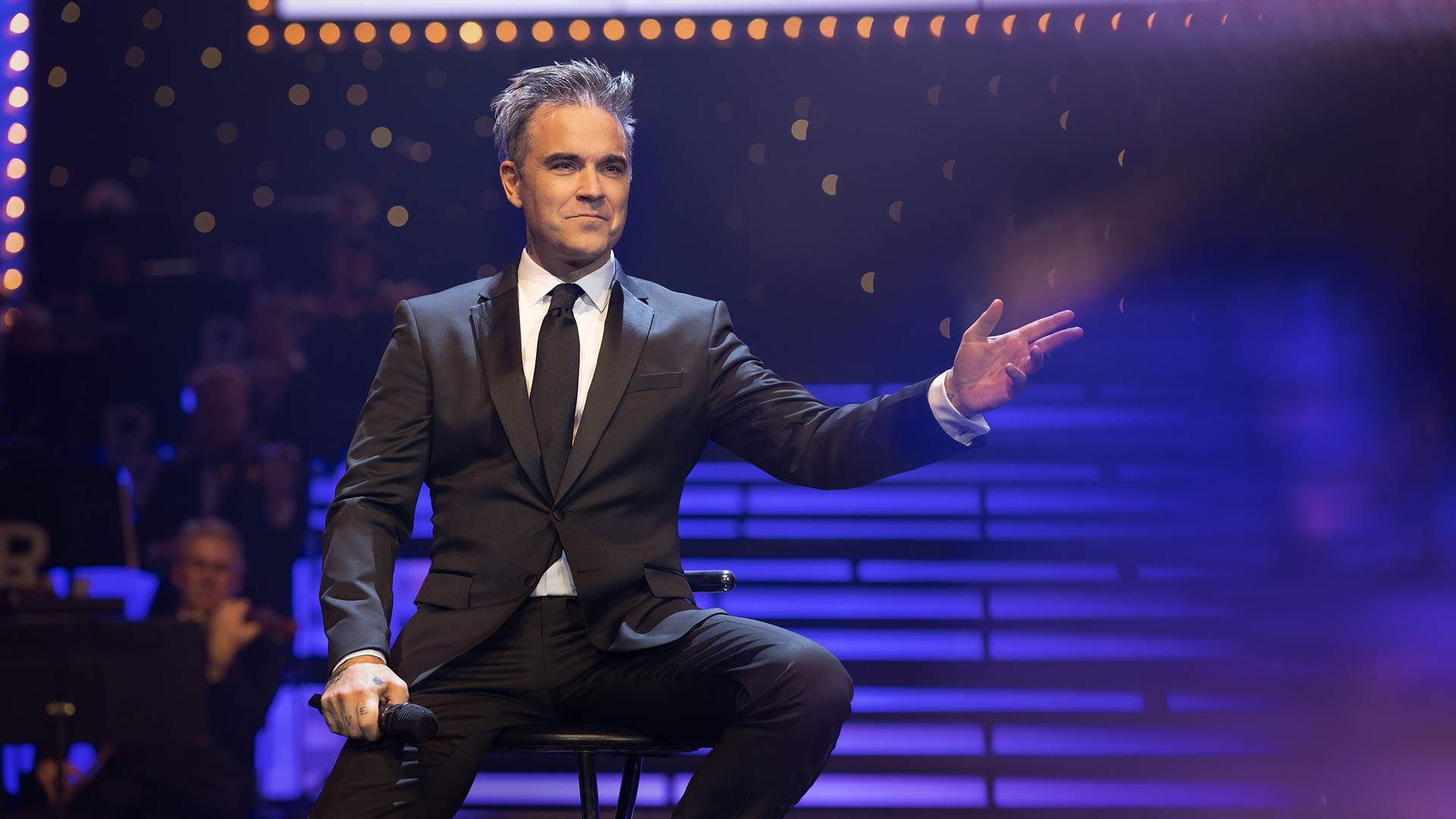
On How The Greatest Showman and Hugh Jackman Helped Bring Better Man About
Michael: "It all stems back to working on The Greatest Showman with Hugh Jackman. Whenever we would talk about PT Barnum and what it was to be a great showman, he would always reference Robbie Williams — which used to make me laugh, and then after a certain period of time really annoyed me, because it was just always his go-to reference. Whether he was talking about music, whether he was talking about his swagger, or his charisma, or whether we were talking about choreography, he's like 'you know, the way that Robbie sort of moves' and I was like 'you know, every reference can't be Robbie Williams'.
So at a certain moment when we were close to going into production, Hugh had a lot of voices in his ear about the music not being good enough, and he started to question the music. And at that point, we'd been working on the film together for six years, so I'd lost a lot of weight in my voice — because I was always the boy who cried wolf, who was like 'no, it's going to be great. This'll be the year we make it'. After six years, people start losing faith a little bit.
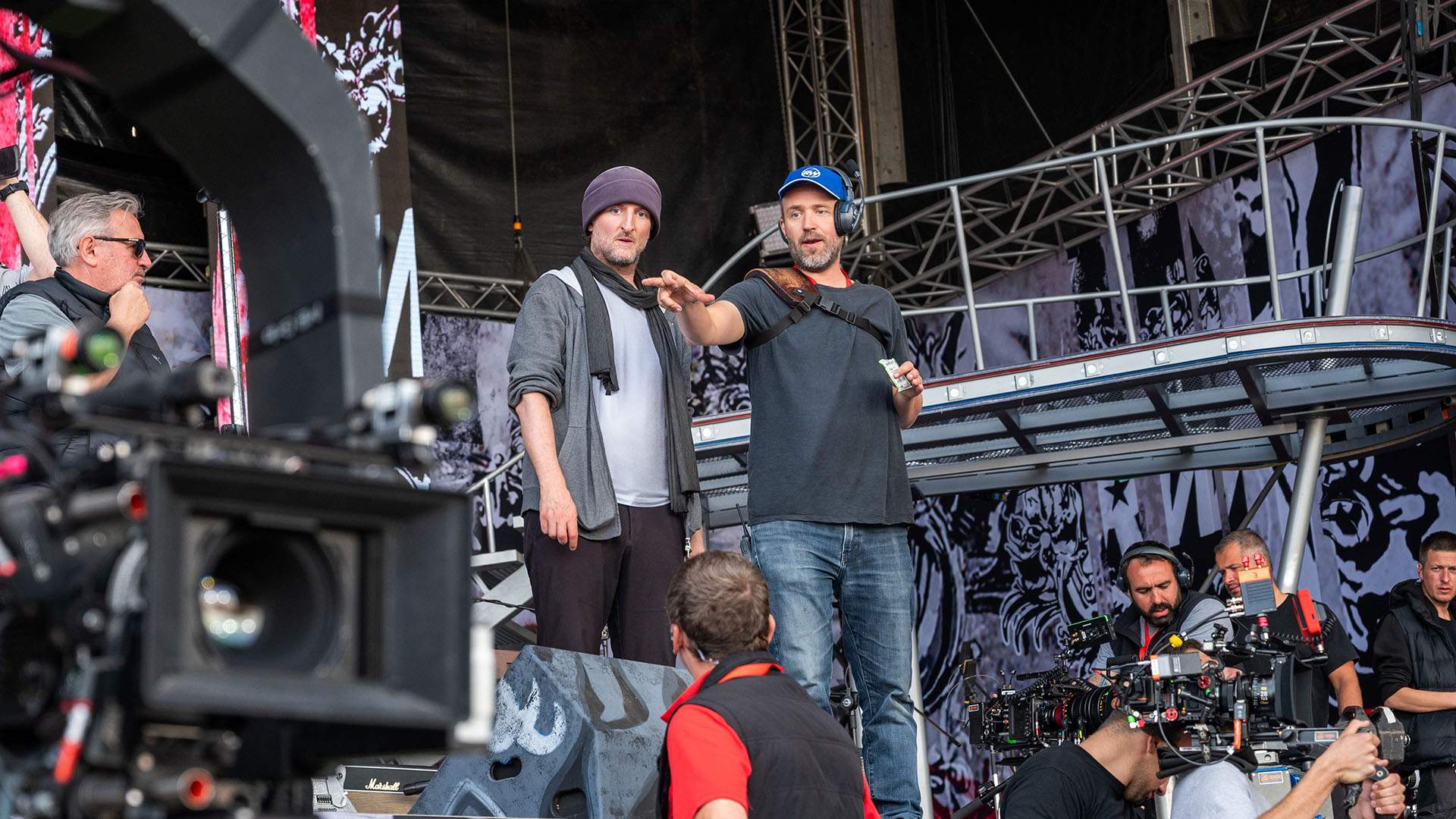
So in a moment where Hugh felt that we should start again on the music, and I knew that that would mean the end of the film — and this is the music that is in the final film that Benji Pasek and Justin Paul wrote — I got in touch through my lawyer, because his daughter is friends with Ayda [Field], who is married to Robbie Williams. You know how you're always just like three people away from the person you want to get to?
So I got a meeting with Robbie on a Sunday at his house, where I told him the story of The Greatest Showman, and then I played him the music. And at the end of the meeting, I said 'look, the only thing more bizarre than me showing up at your house on a Sunday is what I'm about to ask you now. It's one thing for me to tell Hugh Jackman what you think of the music. It's another thing for you to tell him entirely. So if you don't mind, can I just video you and you just talk into the camera as if you're talking to Hugh Jackman?' And that's what he did.
He did this video message, which, to this day, if I'd written the script and said 'can you please read this to convince Hugh that this music is going to be great?' — what he did off the top of his head with ten-seconds' notice is why he is such an amazing showman. He was so compelling, the way he spoke about the music, he basically said to Hugh 'I've spent the last year working on my new album. I would scrap that album to sing these songs'.
He literally was that effusive about how great the music was for The Greatest Showman. And he was right. The music was great. And history went on to prove that. But in that moment, that's exactly what Hugh needed to hear to have the confidence to move forward and make the film. So in many regards, there would be no Greatest Showman if there wasn't that video message from Robbie Williams.
That's how we started then talking, and I just really enjoyed whenever we would talk, when he would tell me stories about his life. And with no intention to make a film — because unlike Jonno, I didn't grow up a Robbie Williams fan. Obviously growing up in Australia, you can't escape him. He's everywhere, but it's not like I listened to him.
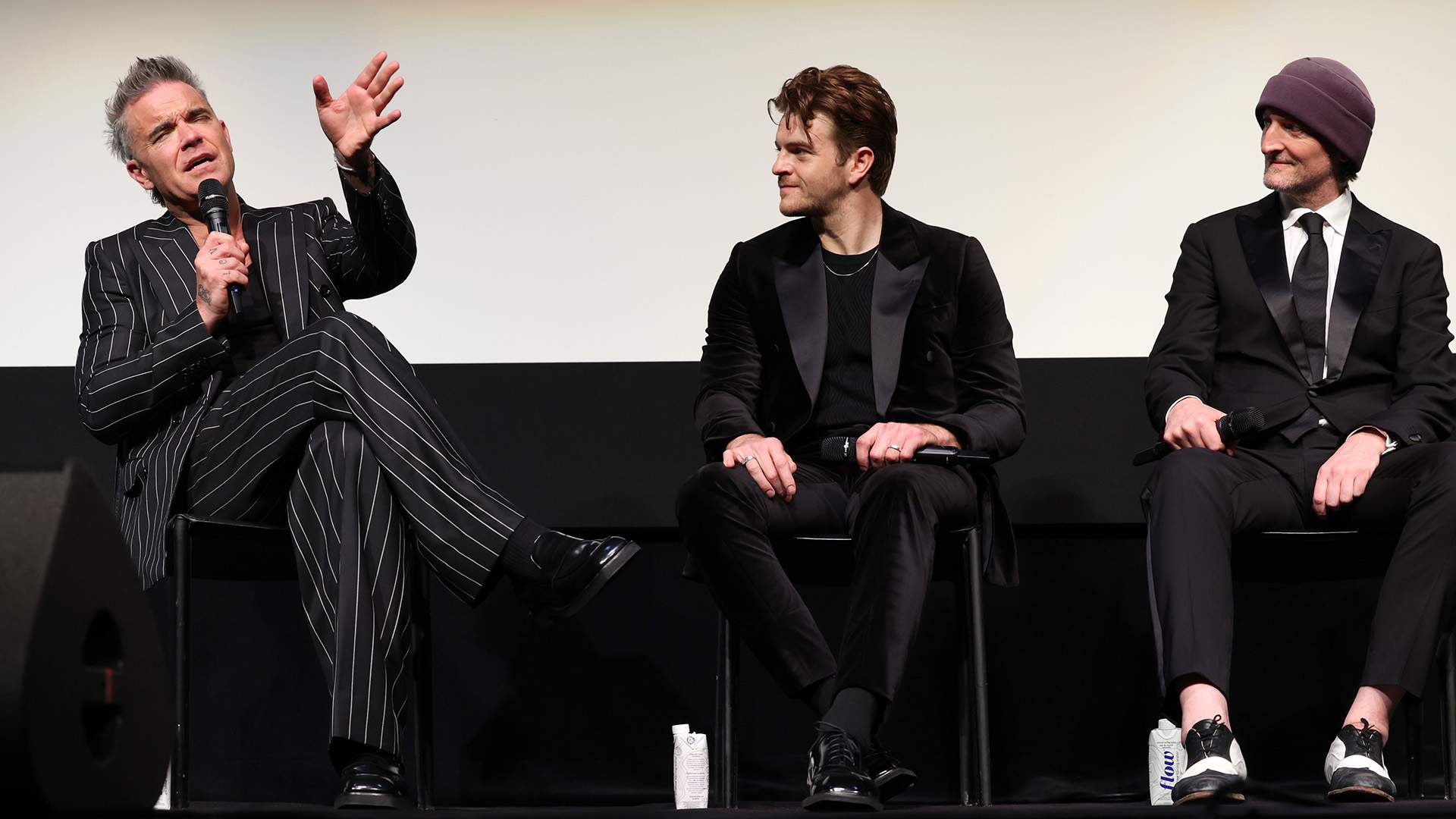
Monica Schipper/Getty Images for Paramount Pictures
But what I really did love is I loved the way in which he talked about his life — and not just the events, but actually his delivery. I really enjoyed the manner in which, whether he's writing lyrics as a storyteller or telling you a story, he's a great storyteller. So I then just asked, knowing that he had a recording studio, when I was in LA, I would just drop over to his house and we would just sit in his recording studio and just chat. And those conversations took about a year and a half, and at some point during that, I started thinking 'wow, I could probably chop these up and make a radio play'. Then I went from there to 'actually this could make a really powerful film'.
And in fact, those some of those recordings are in the actual voiceover of the film — those original recordings. But it was never the intention to make the film. It all stemmed from him and me just sitting in a studio just talking."

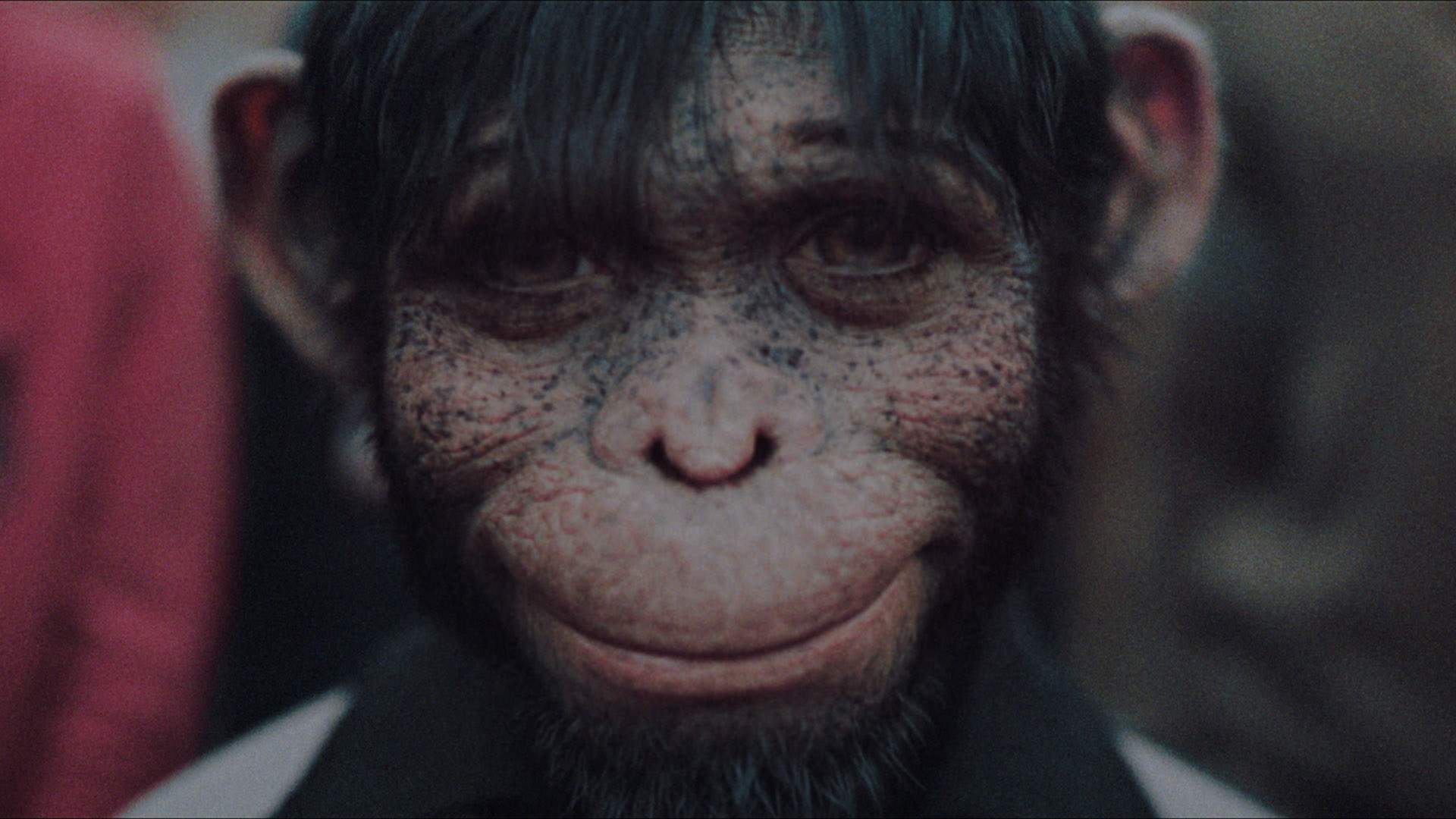
On Why Portraying Williams as a Chimpanzee Was the Right Way to Tell His Story
Michael: "I think that creatively, I just wanted to come at it with a unique angle. And also, I knew that narratively I wanted to explore both his internal life and his external life. So it was trying to find a device that would allow us to step between those two worlds, the world of the imagination and the world of reality.
I think in a musical you're already in a heightened reality, because people are breaking into song, but I wanted something creative that would allow us to see more of Robbie than if it was just an actor playing him. And when I went back to those original recordings and I was listening to them, just time and time again Rob would refer to himself as a performing monkey. He would just say things like 'I was just dragged up on stage to perform like a monkey' or 'I'm up the back dancing around like a performing monkey'. And he said enough times that I was like 'there's definitely something to this performing monkey'.
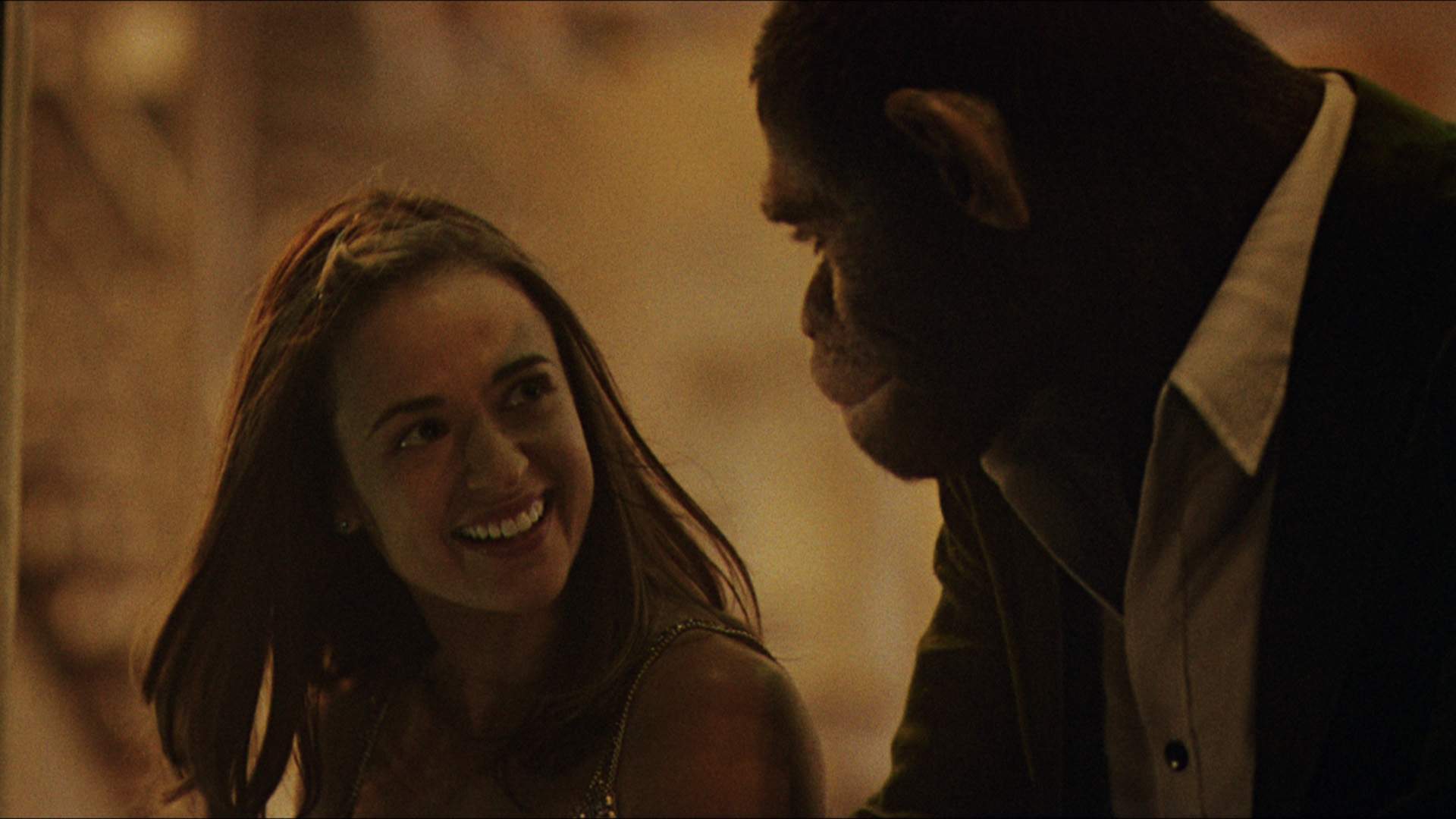
And when I looked at his story, whether it's him pretending to be tougher than he is in front of the kids in Stoke-on-Trent, where he grew up, or whether it's jumping up in front of the TV hoping that his dad would look at him the same way that he looks at Sinatra, there were just all these moments within the story that I was like 'he's always been that little performing monkey'. And the moment that I framed the entire film in that conceit, it just made me smile. I just thought 'this is going to work and it's going to work unbelievably well'.
Convincing other people of that was the difficult part, but not convincing Rob. Rob was onboard in two seconds. I literally went to him and said 'if you're an animal, how would you see yourself?'. And he immediately said 'lion' and looked very proud. Then I sort of went 'really?'. And after about 30 seconds, he went 'nah, more of a monkey'.

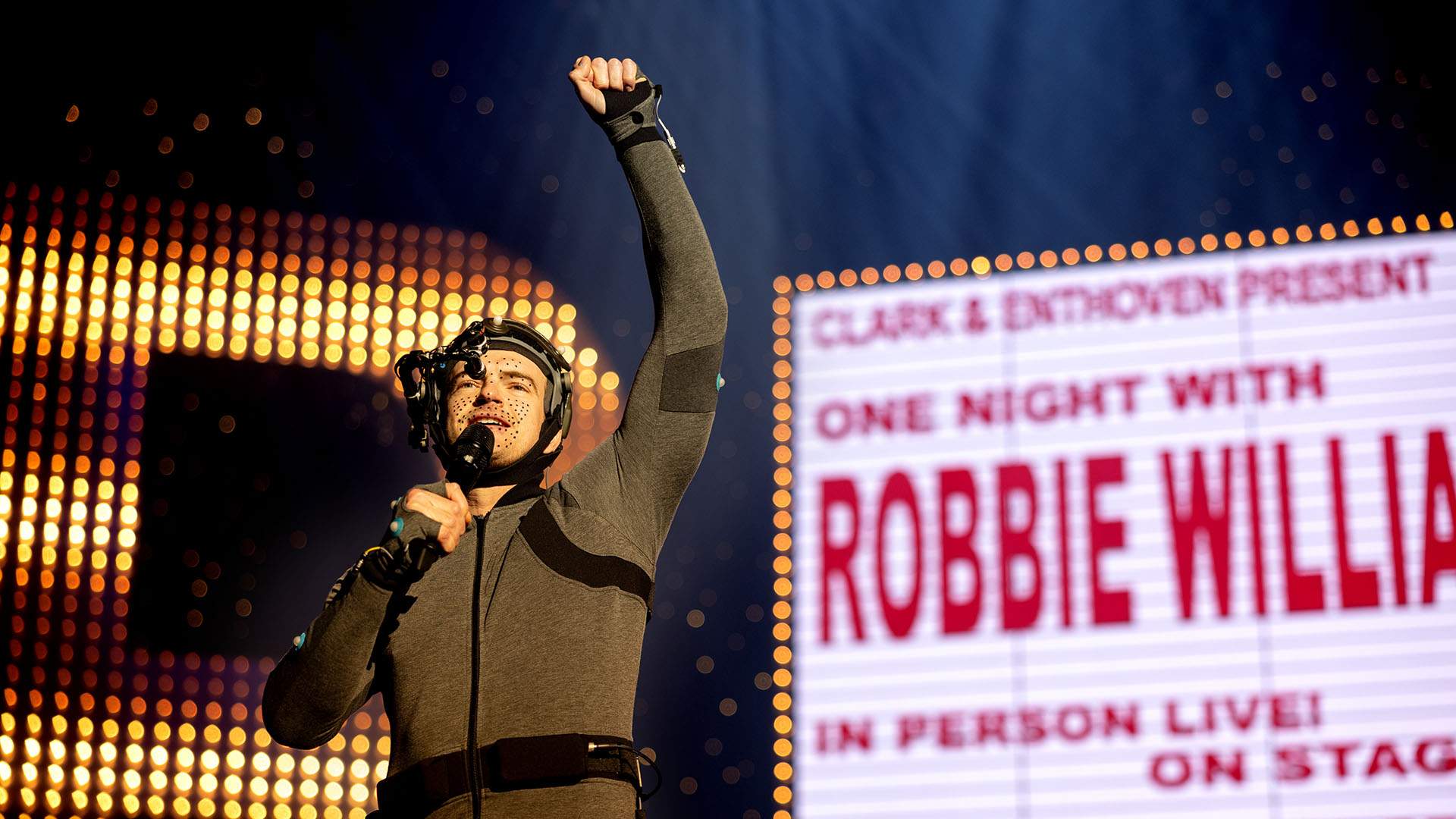
On Davies' First Reaction to Such a Unique Part
Jonno: "There are so many challenges in this thing for an actor that every one is like 'oh my god, another reason to do it, another reason to do it'. One: motion-capture. Two: you are telling someone's story that's still alive, and someone that has many predetermined opinions on them, and so it's kind of up to you to try to shift those things. And I think that's what's useful about the monkey, is it separates people from Robbie Williams, and you follow this monkey story rather than necessarily this global superstar that people think they already know.
But I was blown away by the concept. And I was I was blown away by the dream of it really. That's one of Michael's best assets, is he sells you the dream — but unlike many others, you get to actually go along with it. You get to join it.
I was a massive fan of The Greatest Showman. I have always loved musicals. I love dancing, I love singing, but never thought I really had the chops to be a part of that world — certainly not a Broadway or a West End singer. So to be able to have Rob do the singing and me do the dancing, I was like 'how could I possibly not try to make this mine?'."

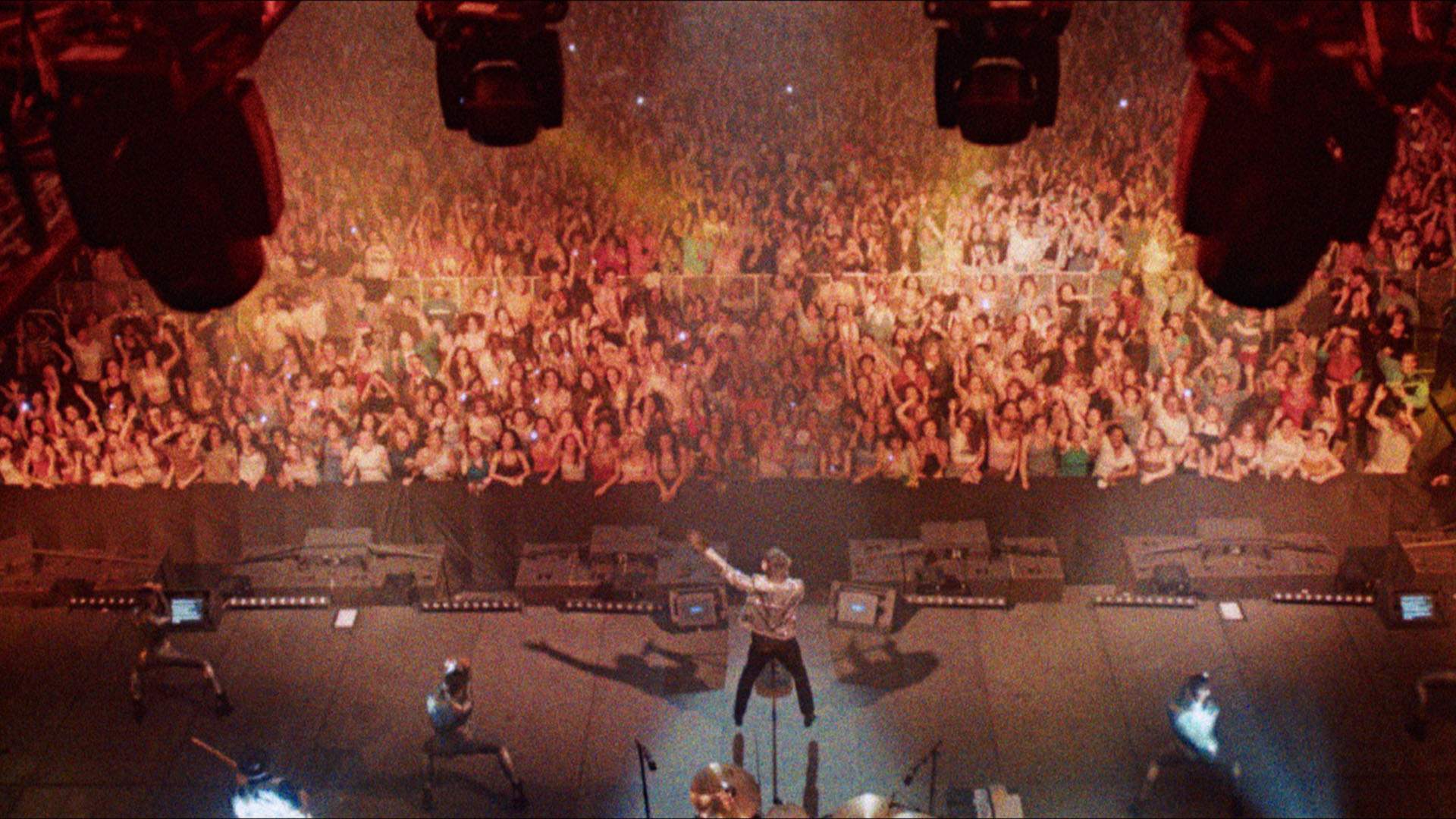
On the Film's Celebration of Resilience and Persistence — and What That Concept Means to Davies and Gracey
Jonno: "Resilience certainly comes in with the life of an actor. You are told 'no' many more times than you are told 'yes.' And you often value yourself on your last job, or the last job you did not get. I think it's about trying to stay resilient and trying to remember that you are authentically you, right? And so even though you're getting your nos, it doesn't mean you're crap, it means that you're just not right for this opportunity. It's a hard memory to keep inside, but I think it's one that is premier above all else.
Otherwise you start to lose your identity. If you start thinking that 'I'm getting nos because I'm not good enough' or 'I'm not the right person', you start shifting your identity. Then you don't become what makes you, and that's essentially your best asset. And so resilience for me is about staying true to yourself, and if you're going to do something — Guy Chambers says it in our film, he says 'own it'. If it's crap, make it your crap. And I think that's a form of resilience that we can all take onboard."
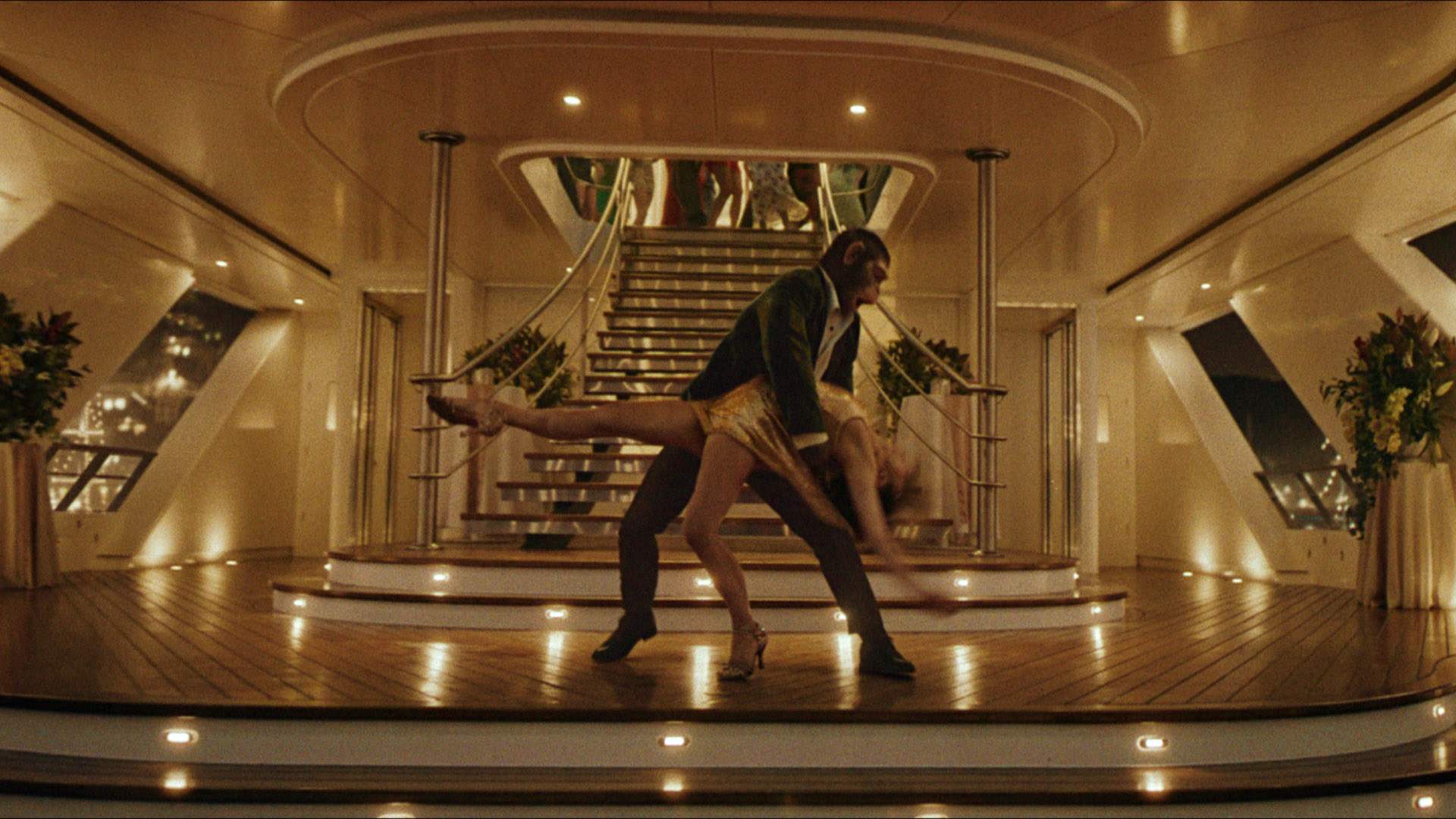
Michael: "Resilience is my entire life, because you have these grand ideas and it's up to you to continue to believe in them year after year after year. Showman took seven years to make, and at one point or another every single person involved in that project gave up hope — and you as the director cannot. Everyone else can lose faith, and you just have to keep on, you have to stand in that burning building and tell everyone it's going to be okay.
This took six years. It was a high-concept idea that scared a lot of people, because the concept of the monkey immediately doubled the budget of the film. It made it a much more risky prospect. And it scared a lot of financiers away. The number of meetings that I had to do where people would just flat-out, the moment the monkey was mentioned, were like 'what are you talking about?' — and 'this is the end of the meeting'. That was the much more common response to that idea. And yet, I knew if there was a way to bring it into reality, it would be unique and it would be something that I'd be incredibly proud of.
And so resilience is my entire career, and I would not be a director if I did not have that resilience. I think the joy you get as a director is finding other people to believe in that impossible dream, who stand alongside you and make it a reality, and that is the greatest privilege that you have as a director."

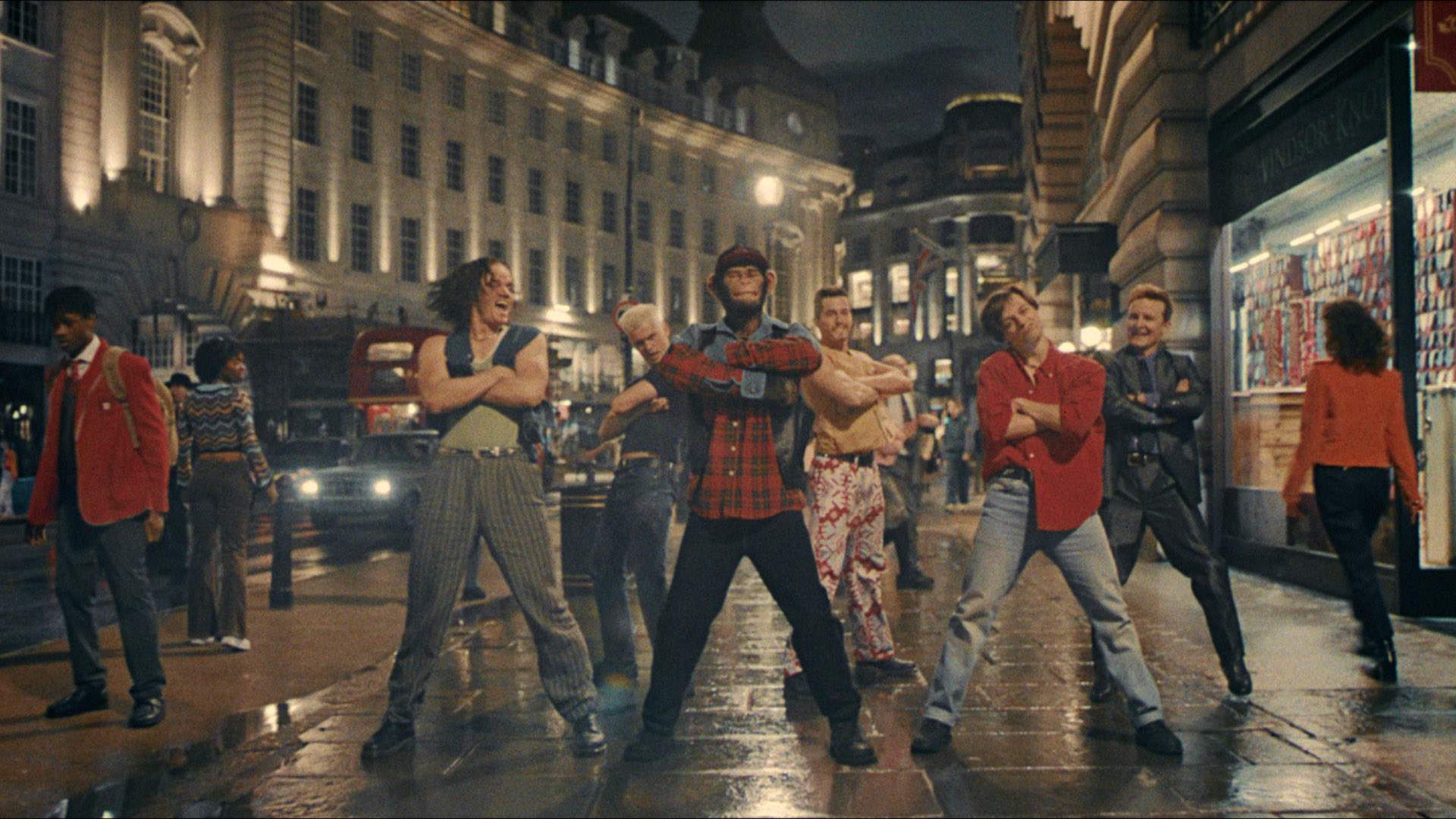
On What It Took to Make the 'Rock DJ' Scene a Reality
Jonno: "A lot of pogo-stick practice.
It was the pinnacle of joy, right, in the film. It's the one moment that Robbie and the audience gets to really just live in dreamland, and there's no darkness that encases it, there's no version of himself telling him telling him he's rubbish. And so we were determined that when we arrived on Regent Street, that would be the feeling that we would feel.
And, of course, you can only have that joy if you've put in the graft beforehand. And that's not just Michael. It's every department. It's Ash and Jen [Ashley Wallen and Jenny Griffin, both returning from The Greatest Showman], the choreographers, making sure that not only us, the Take That boys, but the 500 dancers were drilled so that we were never getting a bad take because of the dancing. You only have a set amount of time on Regent Street, so everyone had to just be shit hot, for want of a better term.
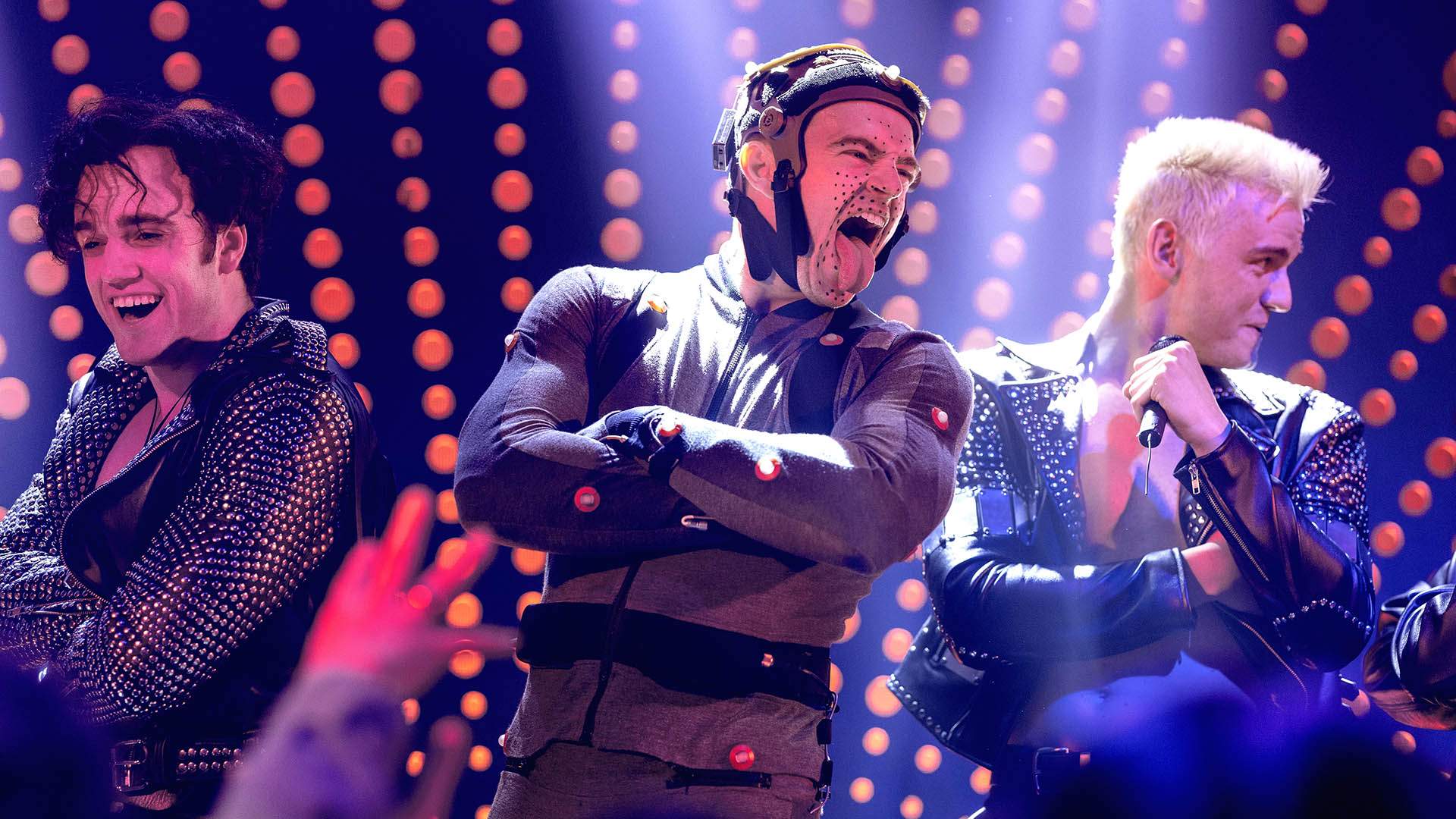
We taped out a hangar, so the minute details, so every bush, every lamp post, was in its exact spot, so that when we arrived on the street, we were ready to go. It wasn't figuring out any proximity, etcetera.
But it was a joy. It was one of my favourite experiences on set. I think you see it on our faces when we when we do Regent Street. I think you can probably see it in our pupils as well. There's kind of joy, combating a bit of 'we've got to get this done'. But it's such an iconic street, and it demanded an iconic routine — and I think Michael has delivered with that.
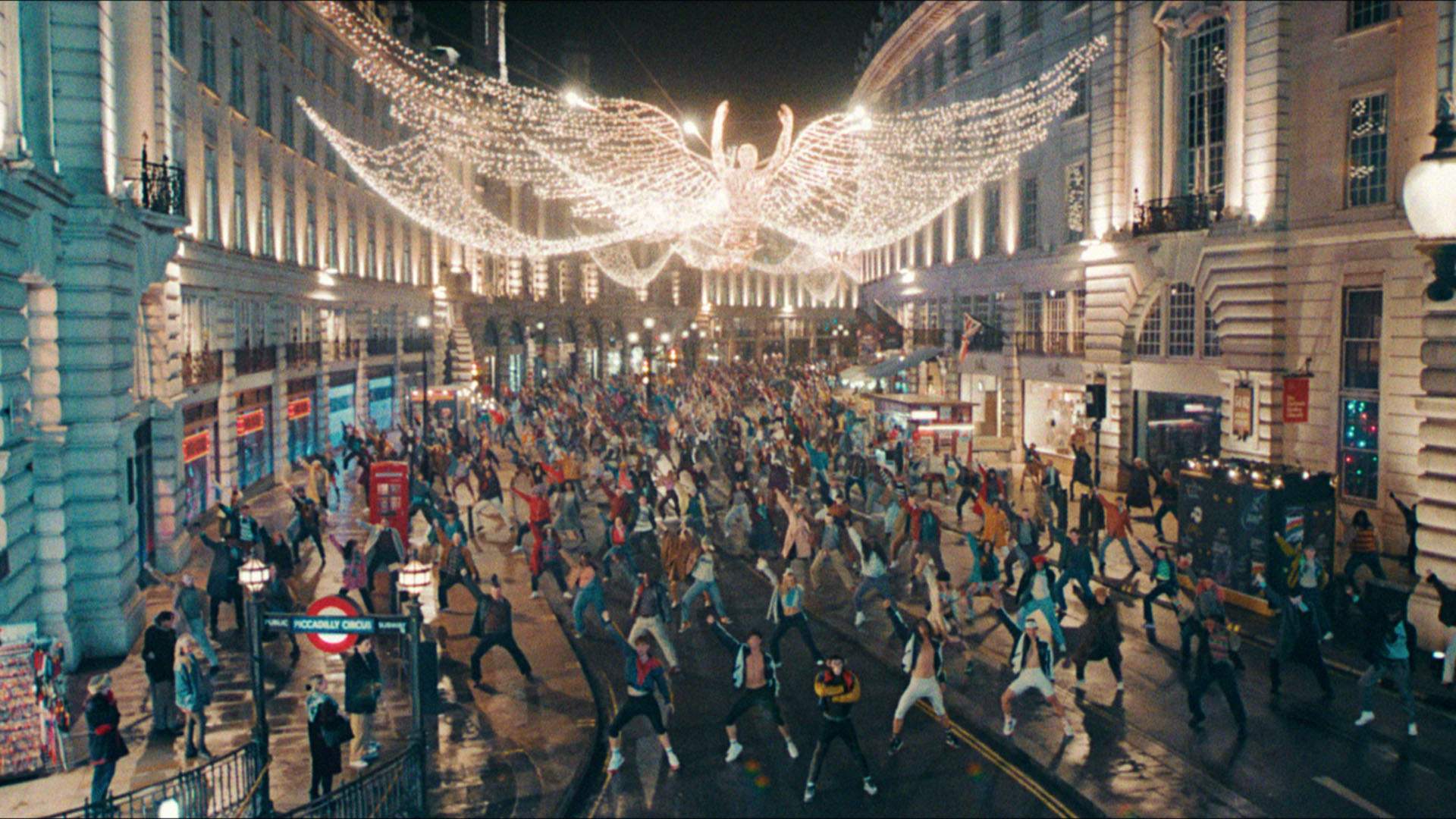
Michael: "The practicalities of pulling that off were enormous. It was a year and a half in the planning. As Jonno mentioned, we rehearsed in a hangar the week before with the entire cast and crew, and double-decker bus and taxi, all those elements — only because the moment we got on the street, we had to start shooting, and we had very limited time overnight where we could lock down the entire street and film.
It was shot over four nights, but after that week of rehearsal in the hangar, literally the day before we were about to start filming, the Queen passed away. And so we got shut down. There's ten days of mourning after the death of the Queen. Regent Street is crown land.
So it was devastating because we paid out all of the costs to shoot. We'd locked down all those stores for those dates. We'd booked all of those dancers. So we lost all that money. There was no insurance for the death of the Queen.
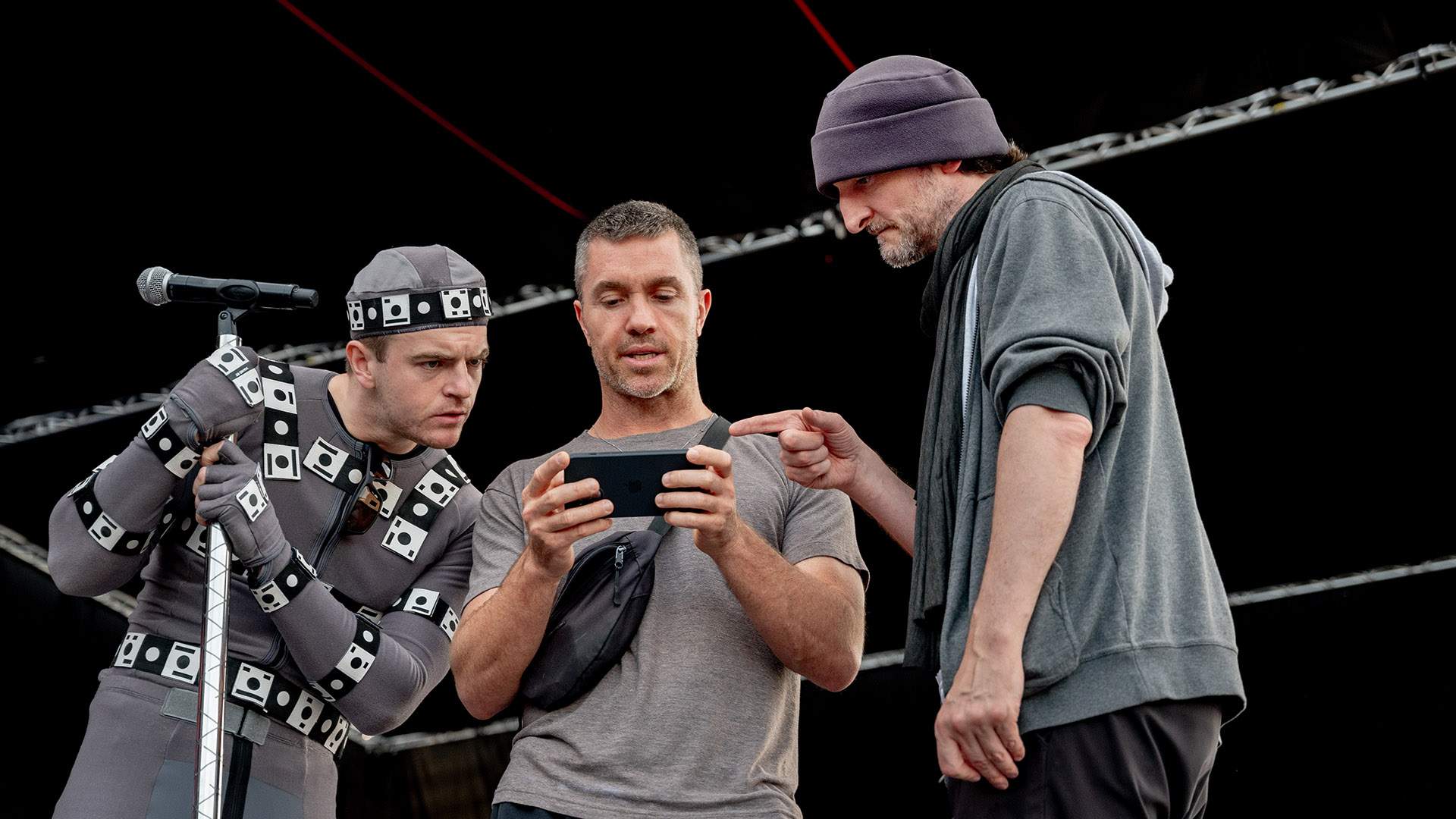
At that point, there were a lot of very serious conversations about cutting the number from the film. And I was like 'we've got to go out, we've got to raise that money again, we've got to get back onto Regent Street and we have to shoot this number — it is absolutely a cornerstone of this story'. It took another five months to find a window where we were allowed back on the street, and to raise the money again.
And so every time that number plays, I just go in my head 'we were this close to that never happening' — but that comes back to your question about persistence.

Better Man opened in cinemas Down Under on Thursday, December 26, 2024.
Michael Gracey will chat about the film at the 2025 AACTA Festival, which runs from Wednesday, February 5–Sunday, February 9, 2025 at HOTA, Home of the Arts, 135 Bundall Road, Surfers Paradise, Gold Coast.
